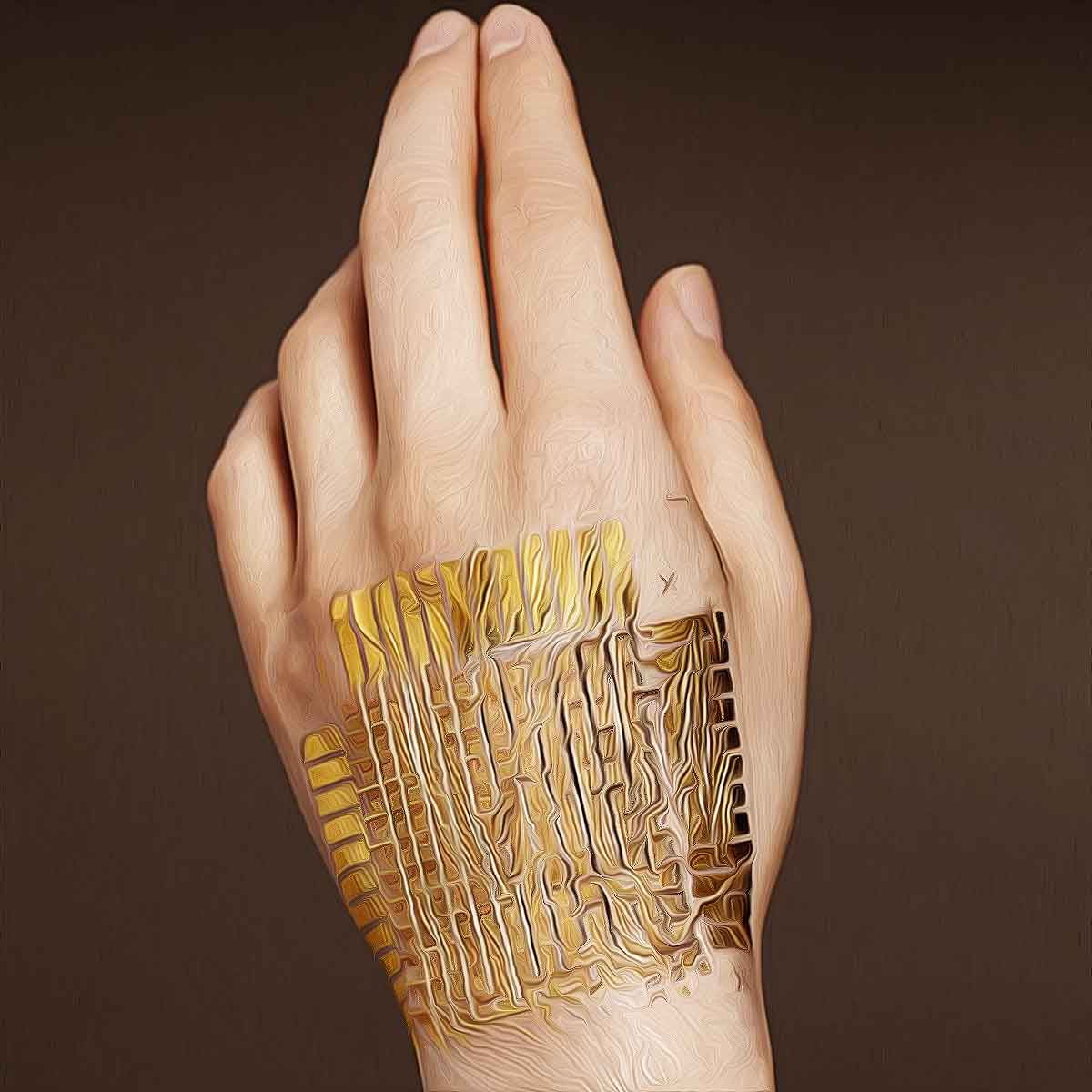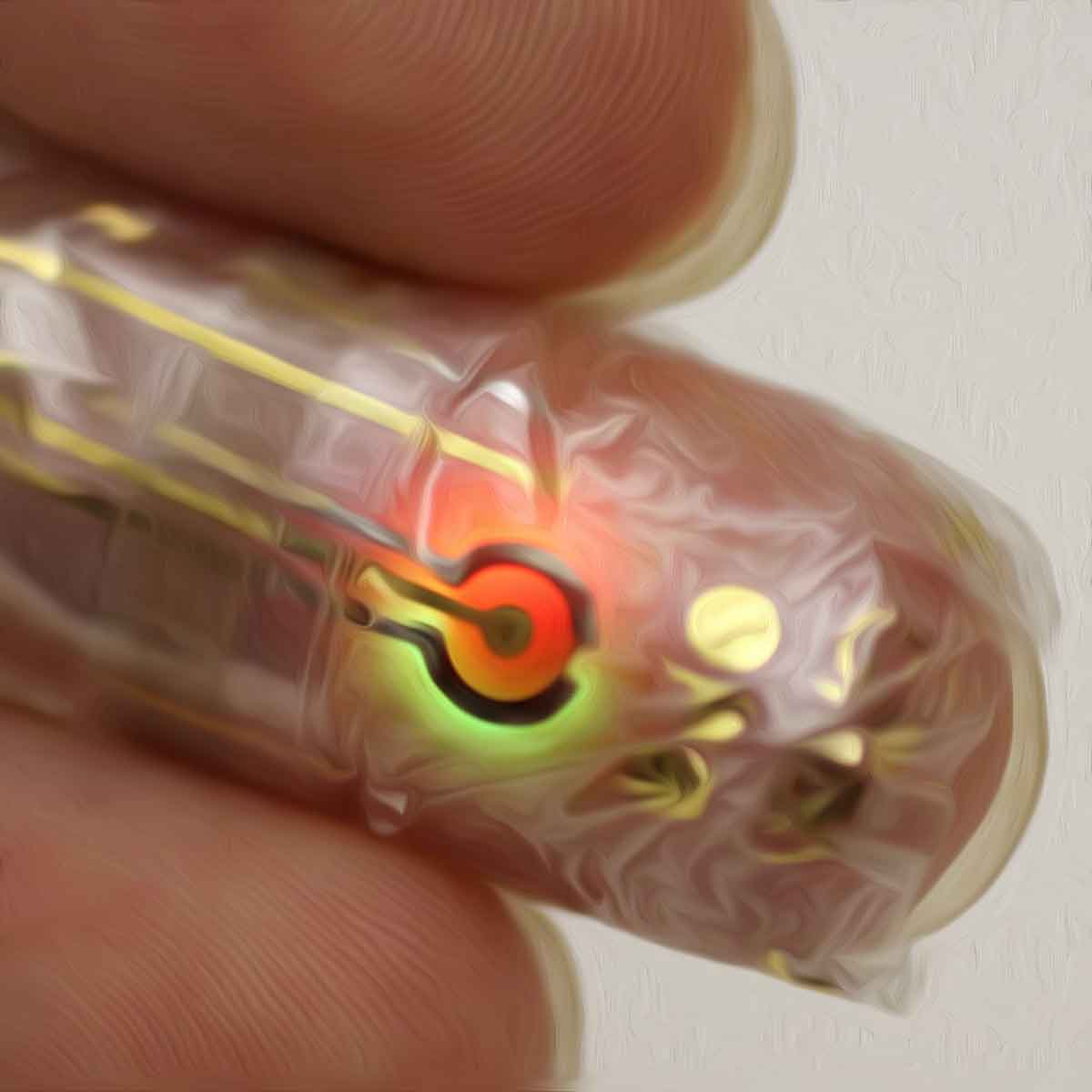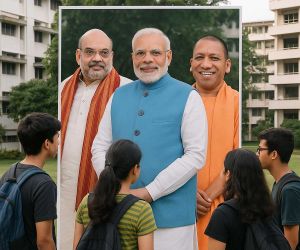MORE COVERAGE
Twitter Coverage
Satyaagrah
Written on
Satyaagrah
Written on
Satyaagrah
Written on
Satyaagrah
Written on
Satyaagrah
Written on
JOIN SATYAAGRAH SOCIAL MEDIA
Team of scientists led by Indian-origin engineer Ravinder Dahiya at University of Glasgow develops an 'Electronic skin' capable of feeling sensations like pain: could provide amputees, with prosthetics with feeling of touch that they lost

A team of engineers at the University of Glasgow in the UK led by India-born Ravinder Dahiya, Professor of Electronics and Nanoengineering at the James Watt School of Engineering, has developed an electronic skin that can feel sensations like pain.
A robot hand that uses the smart skin, has shown that it can ‘learn’ to react to external stimuli. This could help create a new generation of smart robots with near-human sensitivity
More importantly, it could provide amputees, with prosthetics -- artificial arms or legs -- with some semblance of the feeling of touch that they lost.
Prof Dahiya’s team shares details of their work in a paper: ‘Printed Synaptic Transistors based Electronic Skin for Robots to Feel and Learn’, published on June 1, in the journal Science Robotics.
|
The researchers describe how they built their prototype computational electronic skin (e-skin), and how it improves on the current state of the art in touch-sensitive robotics.
For decades, researchers have tried to create artificial (electronic) skin which possesses the sensation of touch. The widely used method was to spread an array of contact or pressure sensors across the electronic skin’s surface to allow it to detect when it comes into contact with an object. Data from the sensors is then sent to a computer to be processed and interpreted.
This can take a while: which is used to delay or degrade the electronic skin’s response to real-world tasks.
 |
E-skin that ‘learns’
The team in Glasgow, overcomes this handicap, by doing some of the processing in situ i.e., at the skin itself, avoiding too much to-and-fro traffic of the data.
In a communication to this reporter today, Prof Dahiya explained the nature of the breakthrough: “The distinctive part of our latest work is the e-skin’s capability to learn and perform some processing of tactile data, at the point of touch itself, instead of sending all raw data to the brain-equivalent on a robotic platform.”
In fact, it is how the human peripheral nervous system works -- and the Glasgow University team drew inspiration from this and mimicked the human system as best it could.
To build an electronic skin capable of quick response, the researchers printed a grid of 168 “synaptic” transistors made from zinc-oxide nanowires directly onto the surface of a flexible plastic surface. (Synaptic devices are those that have the ability to ‘learn’ in ways similar to nerve endings.) Then, they connected the synaptic transistor with the skin sensor present over the palm of a fully-articulated, human-shaped robot hand.
“We believe that this is a real step forward in our work towards creating large-scale neuromorphic printed electronic skin capable of responding appropriately to stimuli,” says Prof Dahiya, who did his M.Tech at IIT Delhi before he moved to the US for higher studies.
Adds Fengyuan Liu, co-author of the paper: “In the future, this research could be the basis for a more advanced electronic skin which enables robots capable of exploring and interacting with the world in new ways, or building prosthetic limbs which are capable of near-human levels of touch sensitivity.”
The recent work would help advances in both robotics and prosthetics, says the team.
 |
References:
 Support Us
Support Us
Satyagraha was born from the heart of our land, with an undying aim to unveil the true essence of Bharat. It seeks to illuminate the hidden tales of our valiant freedom fighters and the rich chronicles that haven't yet sung their complete melody in the mainstream.
While platforms like NDTV and 'The Wire' effortlessly garner funds under the banner of safeguarding democracy, we at Satyagraha walk a different path. Our strength and resonance come from you. In this journey to weave a stronger Bharat, every little contribution amplifies our voice. Let's come together, contribute as you can, and champion the true spirit of our nation.
 |  |  |
| ICICI Bank of Satyaagrah | Razorpay Bank of Satyaagrah | PayPal Bank of Satyaagrah - For International Payments |
If all above doesn't work, then try the LINK below:
Please share the article on other platforms
DISCLAIMER: The author is solely responsible for the views expressed in this article. The author carries the responsibility for citing and/or licensing of images utilized within the text. The website also frequently uses non-commercial images for representational purposes only in line with the article. We are not responsible for the authenticity of such images. If some images have a copyright issue, we request the person/entity to contact us at This email address is being protected from spambots. You need JavaScript enabled to view it. and we will take the necessary actions to resolve the issue.
Related Articles
- "Research is creating new knowledge, without which there is no progress": National Research Foundation - a visionary initiative by the Indian govt aimed at centralizing funding for scientific & academic research with an ambitious target of ₹50,000 crore
- Film critics and a section of ‘secular’ personalities condemned Nambi being portrayed as a devout ‘Hindu’ in "Rocketry: The Nambi Effect", ex-ISRO scientist Nambi Narayanan lashes out at detractors, “Is it a sin to be a Hindu? Is it a sin to be a Brahmin?
- "In self-reliance, there is freedom and dignity": In just 18 months, India has embarked on the domestic production of 38 APIs, marking a massive stride towards pharmaceutical self-reliance. It's more than progress; it's a testament to our national resolve
- "If art is to have a special train, the critic must keep some seats reserved on it": In a momentous event, PM Narendra Modi flagged off Puri-Howrah Vande Bharat Express in Odisha, marking a significant milestone in India's railway infrastructure evolution
- "नई उड़ान": Bharatiya Vayuyan Vidheyak, 2024, replaces the Aircraft Act, 1934, modernizes aviation laws, empowers DGCA, BCAS, AAIB, adds penalties, regulates design, and Aviation Minister K Naidu schools INDI Alliance for opposing the Hindi name
- "Experience the majestic 'Yashobhoomi', an emblem of India's advancements in global conventions and expos, developed with a budget of Rs. 5400 crore, it encompasses 73,000 sqm, featuring 15 convention rooms with the capacity to host 11,000 delegates
- "Global trust, local talent: India's invitation to the semiconductor world": PM Modi announces that India's moment has arrived in the semiconductor, Global leaders unite in praise as India gets ready to take center stage in the semiconductor industry
- "PM Modi's dream project" - Govt investing 481 crores to transform Badrinath, a major Hindu pilgrimage into a Spiritual smart hill by 2025 under Badrinath Master Plan 2023, initiative will enhance local economy, tourism, accessibility, and infrastructure
- "Cosmic camaraderie": India and Russia's space partnership ignites after Chandrayaan-3's lunar triumph, a legacy of cosmic camaraderie—from Aryabhata to Gaganyaan—heralds a new era of interstellar collaboration and boundless cosmic possibilities
- "And the winds and the waves are always on the side of the ablest navigators": ISRO successfully launched GSLV-F12/NVS-01 Mission from SDSC-SHAR, Sriharikota, NVS-01 first of the India's second-generation NavIC satellites that accompany enhanced features
- "Igniting India's resurgence: An epochal infrastructural odyssey": PM Modi inaugurates India's longest cable-stayed Sudarshan Setu, ignites a ₹4,150 crore development wave in Dwarka, embarks on a spiritual dive in Dwarka, blending heritage with progress
- Civil aviation of UP Govt signed a lease agreement with the Airports Authority of India For Construction Of Maryada Purushottam Shri Ram International Airport At Ayodhya: CM Yogi compared the airport to ‘Pushpak Viman'
- "Trapping a Scientist": A Kerala cop maliciously framed ISRO scientist Nambi Narayanan in an espionage case after a Maldivian woman rejected his advances, leading to intense surveillance of innocents, and a Supreme Court-mandated Rs 50 lakh compensation
- "Story of India’s herculean scuffle to get the Cryogenic Engine": India's heavy lift ambitions and ultra-low-cost model could put the likes of NASA out of business, an eventuality that the USA tried to delay India’s space program as long as it can
- "Cyberspace undeniably reflects some form of geography": Ashwini Vaishnaw launched "Bharat 6G Alliance" for better collaboration between Govt, industry and academia in developing indigenous 6G products, India already has 200+ patents for 6G

























